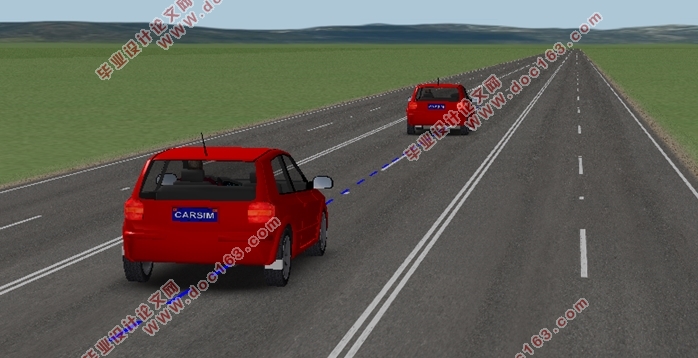电动小车自动起停跟随实验研究

1.无需注册登录,支付后按照提示操作即可获取该资料.
2.资料以网页介绍的为准,下载后不会有水印.资料仅供学习参考之用.
密 惠 保
电动小车自动起停跟随实验研究(任务书,开题报告,文献检索,外文翻译,论文29000字)
摘要
如今各大车企,研究单位越来越重视高级驾驶辅助驾驶系统的研究,同时市场对于高级驾驶辅助系统的需求旺盛。在此背景下,本文进行了起停自适应巡航系统控制策略研究,了解了起停巡航控制系统及ACC自适应巡航控制系统的研究历史及国内外研究现状,并说明了系统的基本原理,组成,结构及其具体功能。经过研究,本文将起停巡航系统控制器设计为分层式结构,分为顶层运动决策层,底层执行控制层。
顶层运动决策层,通过可变安全距离模型,PI速度控制算法,线性二次型最优控制算法决策出期望的加速度。底层执行控制层建立汽车纵向动力学方程计算期望的驱动力矩,并通过发动机逆查询表查找该时刻期望的发动机节气门开度,进行驱动控制。基于汽车纵向动力学方程计算期望的制动力矩,并转换为制动主缸压力,进行制动控制。同时还设计了驱动制动控制模式切换策略。
为对起停巡航系统控制算法进行仿真,验证其有效性。本文搭建了Matlab/Simulink与Carsim的联合仿真平台。通过对系统典型运行工况的分析,其结果表明本文所设计的起停巡航系统控制策略能够实现自动跟随前方目标车辆起步停车,稳态跟随前方目标车辆等运行工况,并能有效且及时的应对复杂的交通场景,控制算法鲁棒性较好。同时通过调成控制参数能够实现不同驾驶风格的跟车模式。
[资料来源:http://www.THINK58.com]
经过软件联合仿真验证后,在进行实车验证前,为尽量模拟现实场景,同时降低实车试验成本,将汽车动力学模型修改为模拟电动小车的汽车动力学模型,再次进行仿真验证。其仿真结果准确无误,随后进行实车试验。通过自动起停,跟随工况试验后发现控制效果在动力响应方面不够理想,并在底层控制器中加入前馈加反馈PID扭矩控制算法,并再次进行实车试验,实验结果较为理想,有效验证了设计的控制策略。
关键词:
汽车、高级驾驶辅助系统、起停巡航控制系统、线性二次型最优控制、扭矩控制
ABSTRACT
Nowadays, the research institutes of major automobile enterprises pay more and more attention to the research of advanced driving assistant system, while the market demand for advanced driving assistant system is strong. In This paper, the control strategy of start-stop adaptive cruise system is studied. The research history and research status of start-stop adaptive cruise control system and ACC adaptive cruise control system at home and abroad are understood. The basic principle, composition, structure and specific functions of the system are explained. After research, the controller of start-stop cruise system is designed as a hierarchical structure, which is divided into top-level motion decision-making layer and bottom-level execution control layer. [资料来源:http://think58.com]
At the top level, the expected acceleration is determined by variable safety distance model, PI speed control algorithm and linear quadratic optimal control algorithm. The bottom executive control layer establishes the vehicle longitudinal dynamics equation to calculate the desired driving moment, and finds the desired engine throttle opening at that time through the engine inverse query table for driving control. The desired braking moment is calculated based on the vehicle longitudinal dynamic equation and converted to the main cylinder pressure for braking control. At the same time, the switching strategy of driving and braking control mode is designed.
In this paper, a joint simulation platform of MATLAB/Simulink and Carsim is built to validate the control algorithm of start-stop cruise system. Through the analysis of typical operating conditions of the system, the results show that the control strategy designed in this paper can achieve automatic starting and stopping, steady-state Car-Following and other operating conditions, and can effectively and timely respond to complex traffic scenarios, and the control algorithm has good robustness. At the same time, different driving styles can be achieved by adjusting control parameters.After the joint simulation of the software, in order to simulate the real scene as much as possible and reduce the cost of the real vehicle test, the vehicle dynamic model was modified to simulate the vehicle dynamic model of the electric car, and then the simulation was carried out again. The simulation results are accurate, and then the vehicle test is carried out. Through automatic start-stop and follow-up test, it is found that the control effect is not ideal in dynamic response. Feedforward and feedback PID torque control algorithm is added to the bottom controller, and the vehicle test is carried out again. The experimental results are ideal, which validates the designed control strategy effectively. [来源:http://www.think58.com]
Key Words:
Automobile,Advanced Driver Assistance Systems,Stop&GoCruise System,Linear quadratic optimal control,Toque Control
主要研究内容
如今汽车产业对智能汽车,电动汽车技术尤为重视,高级辅助驾驶技术正不断进步。基于以上背景,本文提出分布式电机驱动电动汽车的起停巡航控制系统控制策略及控制算法的研究。主要目的是设计出较为完整的起停巡航控制系统控制策略,基于Matlab/Simulink,Carsim软件搭建车辆运动仿真平台进行算法的验证,最后在AGV无人小车平台上进行实车验证。因此本文的研究内容主要包括以下几个方面:
第一章:绪论。本章主要介绍了研究的背景及意义,传统自适应巡航控制系统与起停巡航系统的联系与不同。并介绍了传统自适应巡航控制系统与起停巡航系统的国内以及国外的研究发展现状,并阐明本研究的主要内容。
第二章:起停巡航系统控制策略设计。控制策略主要分为决策层和执行控制层。决策层先后采用PI速度控制算法,LQR算法,并仿真验证比对结果。最终采用LQR算法,虽然系统跟踪性略有降低,但提高了系统的舒适性及安全性。
第三章:起停巡航系统控制器仿真分析。本章运用Matlab/Simulink,动力学仿真软件Carsim软件搭建了起停巡航系统的验证平台。对多种不同工况(追赶前车,定速巡航,自动停车起步)进行分析,并调整系统参数研究其对控制效果的影响。 [资料来源:THINK58.com]
第四章:起停巡航系统实车试验。本章基于Compact RIO以及南京荣骏AGV实验平台进行起停巡航系统试验平台搭建,在此基础上在离线环境下进行算法验证,并进行调试工作。
最后,进行全文总结,提出研究缺陷以及有待改进之处。


目录
摘要 I
ABSTRACT II
第1章 绪论 1
1.1 研究的背景及意义 1
1.2 起停巡航控制算法研究现状 2
1.3 主要研究内容 4
第2章 起停巡航系统控制策略设计 6
2.1起停巡航系统架构 6
2.2顶层控制器算法设计 6
2.3底层控制器算法设计 14
2.4本章小结 20
[资料来源:http://THINK58.com]
第3章 起停控制策略仿真分析 22
3.1系统仿真平台 22
3.2系统软件仿真平台 25
3.3典型工况仿真分析 34
3.4本章小结 41
第4章 起停巡航系统实车试验研究 42
4.1起停巡航系统实车试验平台搭建 42
4.2实车试验 45
4.3本章小结 47
第5章 结论与展望 48
5.1全文总结 48
5.2工作展望 48
参考文献 49
致谢 52
